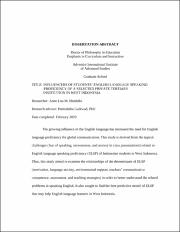| dc.description.abstract | The growing influence of the English language has increased the need for English language proficiency for global communication. This study is derived from the typical challenges (fear of speaking, nervousness, and anxiety in class presentations) related to English language speaking proficiency (ELSP) of Indonesian students in West Indonesia. Thus, this study aimed to examine the relationships of the determinants of ELSP (motivation, language anxiety, environmental support, teachers‘ communicative competence, assessment, and teaching strategies) in order to better understand the related problems in speaking English. It also sought to find the best predictive model of ELSP that may help English language learners in West Indonesia.
After employing a postpositivist research paradigm, a correlational research design was used to obtain the perceptions of 251 simple randomly selected university students from West Indonesia. To gather data, 6 dependent variables were measured using the 4 modified scales and 2 researcher-constructed scales. The students‘ ELSP (dependent variable) was measured using their English Language 3 speaking scores. Several procedures of data screening were used in this study. The final data analysis was done using Statistical Package for the Social Sciences, specifically descriptive statistics, t-test, Pearson‘s r correlation, and Structural Equation Modeling.
The findings of the study revealed that none of the determinants (motivation, language anxiety, environmental support, teachers‘ communicative competence, assessment, and teaching strategies) had a significant correlation with ELSP. Since the determinants were not correlated, the determinants were not good predictors of ELSP. The data collected did not support the proposed conceptual framework and the theories used in this study.
The findings point to the need for alternative ways to enhance the ELSP of university students in West Indonesia. This study can be replicated with different samples also from East Indonesia to identify the causes of the mismatch of theories used in this study since Indonesia has not officially accepted English as a second language. There is a need for further research to identify other determinants that may enhance ELSP. | en_US |

